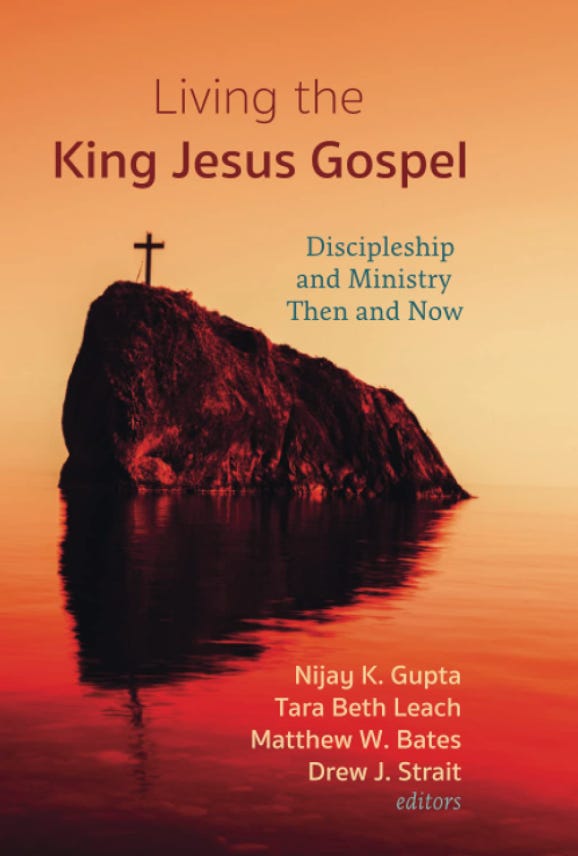David Fitch says there are six gospels on offer today: (1) the Billy Graham gospel of traditional evangelicalism, (2) the Social gospel of the mainline, (3) the liberation gospel in liberation theologies, (4) the 4-fold gospel or “full” gospel of Pentecostal-Holiness churches, (5) the “good” gospel of the Neo-Calvinist/Dutch movement that shaped post WW2 evangelicalism [SMcK: this is not recognized by enough thinkers], and (6) the King Jesus gospel of the New Perspective, which David pins on my head.
Photo by Tim Mossholder on Unsplash
That right there is enough for more than a full day’s conversation because just articulating what each believes and the implications for mission from each become not only fascinating but existentially relevant at deep levels of faith and practice. Each of these gospels forms a culture, habits of the heart and mind, and a way of life. He writes this in Nijay Gupta, Tara Beth Leach, Matt Bates, and Drew Strait (eds.), Living the King Jesus Gospel: Discipleship and Ministry Then and Now.
I’m honored David wrote on this theme because I have at times wondered what he was teaching about the gospel in his classes, so putting this all into written form by him will give me easier access to his ideas. The truth about this chapter is that David asked me to read a paper he was writing for a publication and he wanted to see I got a few things straight. Lo and behold! It was for this tribute volume.
Billy Graham: sin problem, provision of Christ, the human response (plus promise of salvation and heaven). Justification by faith in its Reformation mode is the foundation. The kingdom is mostly future; the Christology is orthodox. It forms mission in the direction of individual proselytization. Christ is at work in the church, not in the society. Social activism is a portal to evangelism. Romans 3.
Social Gospel: As stated by Rauschenbusch, the kingdom at work now is “humanity organized according to the will of God.” Kingdom and reconstituting the social order belong together. The problem is systemic sin in the social orders. The kingdom reveals the sins, frees people, and proclaims a God who is at work to disrupt these systems to bring justice. Democracy then is a kingdom order. This gospel forms people toward social activism for justice, and the church educates its people how to participate in systemic changes. Mark 1:15.
Liberation gospel: the kingdom liberates from systemic oppression that enslaves the marginalized, so this gospel takes the previous into the world of the marginalized and shifts it from democracy and progress to God at work among and present with the poor. This gospel forms people for justice that takes root among the marginalized. But it does so by exposing systemic injustices, though some forms of liberation theology center on local base communities. Luke 4:16-30.
4-fold Gospel: (This is David Fitch’s background.) Jesus is savior, sanctifier, healer and coming king. Isa 53:5 is crucial along with Matt 8:16-17. I’m brief with this one, so David will have to forgive me. The formation for mission works into individual but wholistic/whole salvation and not just the soul. It is body and soul, but David’s right: it can be much more tied to the Holy Spirit and the Spirit’s work in this world.
Good gospel: this is a term I have no heard. Here evangelicalism was breaking free of fundamentalism and found Neo-Calvinism as it’s landing place. It placed the Billy Graham gospel alongside active work for justice in society. He sees Kuyper, Mouw, Wolterstorff, Os Guinness and Chuck Colson, but also Keller, Russ Moore and JKA Smith. Thus Col 1:16-18 which combines creation and redemption and this means it’s about common grace too. The world and its systems are framed more positively. (This is big.) The formation is toward individual proselytization as well as toward activism for the common good. This is the Kuyperian theme.
King Jesus gospel: covenantal justification is more expansive than in the Billy Graham model. For the KJG it moves toward God’s faithfulness to the promises through Israel for the world as God sends Christ for the kingdom to make the world right. That is, a world in disorder, a false rule, and a false narrative (his terms). Salvation then is to enter into God’s kingdom redemption and not just one’s personal salvation. David rightly observes – thanks David – that kingdom when connected to church as I do in Kingdom Conspiracy reshapes the mission implication. The mission is to form a community “in the world as a witness to the gospel.” David then ties this to his Faithful Witness book as he brings in living together, eating together, reconcile, share finances, etc.. In other words a kingdom koinonia (don’t steal that David).
The two major differences are in individualism vs. community formation and over how one perceives worldly power engagement, with more individualism in the first five approaches. In our world, the idea of sending individuals out into the world to change it is hazardous and we need communities that embody a faithful witness.
Thanks very much for this, David. Insightful read.






The way I conceptualize the King Jesus gospel is that Person (namely Jesus) is the first order of business while Proclamation (forgiveness of sins) flows from it. To rush to proclamation without giving the Person of Jesus his proper due/emphasis is to make the gospel a crass transaction.
What is the gospel offered by the Catholic Church? the Orthodox Church?